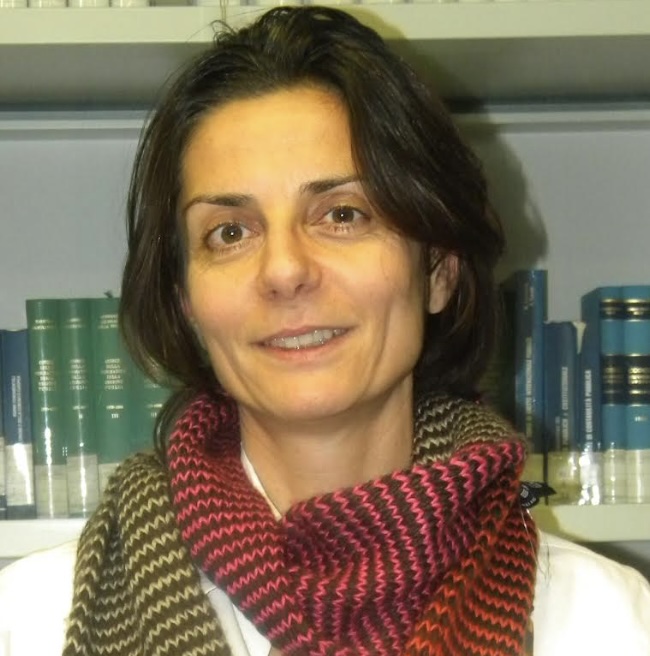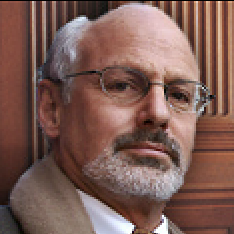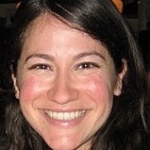Researchers from other institutions come to The Center for visits of a few weeks or longer to carry out research, write or teach in the area of neuroscience and society.
Over the past few years we have hosted many visitors, for periods ranging from a few weeks to a year. With our new suite of offices in the National Historic Landmark Goddard Labs building, designed by early modernist architect Louis Kahn, we will be welcoming more scholars to join us and bring their work projects to the CNS.
Giovanna De Minico

Giovanna De Minico a Professor of Constitutional Law, Federico II University of Naples. She has authored six books: Antitrust and Consob. Objectives and Duties, Cedam, 1997; Rules: Command and Consent, Giappichelli, 2005; Internet: Rule and Anarchy, Jovene, 2012; Ancient Freedoms and New Digital Frontiers, Giappichelli, 2016; Constitution: Emergency and Terrorism, Jovene, 2016; Freedom on the Web: Freedom from the Web, Giappichelli, 2020. More than thirty essays in national and international peer reviewed journals and edited books around the themes: Independent Regulatory Authorities, Heteronomy and soft law; Constitutional emergencies; Internet Regulation; Artificial intelligence and public policy; NRRP and European legitimacy. She is currently Legal Chief of the Legal Unit for two MUR partnerships, both funded by the Italian NRRP: “Regulation and Legal Aspects for Future Networks and Services,” part of the “RESTART – RESearch and innovation on future Telecommunications systems and networks, to make Italy more smart” project; and W.P. 3.8 “Legal and Societal Issues in Resilient AI,” part of the “Future Artificial Intelligence Research (FAIR)” project. You can read more about her work on her website here.
Professor De Minico has been conducting her research, meetings, and speeches at the Center on various topics, which are summarized in the slides referenced below:
- Neurorights and their Blurred Boundaries
- Artificial Intelligence Act: Shadows and Lights
- How to Regulate the Internet
Anita Mollo
 Anna Anita Mollo, PhD is a Research Fellow in Private Law at the Scuola Superiore Meridionale, Università degli studi di Napoli Federico II, where she is Holder of the teaching course for ordinary and doctoral students entitled “Private Law and the protection of Persons with Disabilities: principles, institutions and operational rules also in the light of technological development.” She is the author of a monograph entitled, “Eredità digitale. Tutela e profili di pianificazione,” and several publications on Inheritance Law, personal data protection, neurotechnologies applied to vulnerable persons and AI. She is member of the research Centre “ReCEPL. Research Centre of European Private Law” at the University Suor Orsola Benincasa in Naples, where she obtained her PhD in “Humanities and technologies: an integrated research path”. She is also member of “Centro Interdipartimentale di Progettazione e Ricerca di Ateneo Scienza Nuova – Living Lab UTOPIA” She is member of the teaching staff of the Jean Monnet Chairs PROTECH (European Protection Law of Individuals in relation to New Technologies) and EUGREENEXT (European Green Rights: re-shaping fundamental rights for next generations). She collaborates as lecturer with the chairs of Institutions of Private Law, Private Law, New Technology Law, Legal Drafting Techniques.
Anna Anita Mollo, PhD is a Research Fellow in Private Law at the Scuola Superiore Meridionale, Università degli studi di Napoli Federico II, where she is Holder of the teaching course for ordinary and doctoral students entitled “Private Law and the protection of Persons with Disabilities: principles, institutions and operational rules also in the light of technological development.” She is the author of a monograph entitled, “Eredità digitale. Tutela e profili di pianificazione,” and several publications on Inheritance Law, personal data protection, neurotechnologies applied to vulnerable persons and AI. She is member of the research Centre “ReCEPL. Research Centre of European Private Law” at the University Suor Orsola Benincasa in Naples, where she obtained her PhD in “Humanities and technologies: an integrated research path”. She is also member of “Centro Interdipartimentale di Progettazione e Ricerca di Ateneo Scienza Nuova – Living Lab UTOPIA” She is member of the teaching staff of the Jean Monnet Chairs PROTECH (European Protection Law of Individuals in relation to New Technologies) and EUGREENEXT (European Green Rights: re-shaping fundamental rights for next generations). She collaborates as lecturer with the chairs of Institutions of Private Law, Private Law, New Technology Law, Legal Drafting Techniques.
John Philipsborn
 John Philipsborn, MEd, JD, MAS, is a lawyer in private practice in San Francisco, California. He is primarily a criminal defense lawyer who has, for many years, defended complex cases including death penalty cases. His work is recognized in many published rulings from a wide variety of courts including the U.S. Supreme Court. He has represented foreign nations in litigations involving human rights issues in the U.S. For many years John has been involved in the continuing education of lawyers and forensic mental health professionals in various parts of the United States. He has often litigated cases in which there have been questions about the scientific and technical issues involved in assessing mental state, competence to stand trial, intellectual disability and other legally significant states of mind. With a background in criminology and research methodology, he has authored book chapters and many articles that address issues in forensic mental health and forensic science practice. His work at the Center has been focused on the use of neuroscientific methods and techniques in connection with the prediction of future violence. A two time Fulbright Scholar, John’s contributions have been recognized by awards from several professional organizations. John is currently working with the Center’s leadership on projects involving neuroscience and law.
John Philipsborn, MEd, JD, MAS, is a lawyer in private practice in San Francisco, California. He is primarily a criminal defense lawyer who has, for many years, defended complex cases including death penalty cases. His work is recognized in many published rulings from a wide variety of courts including the U.S. Supreme Court. He has represented foreign nations in litigations involving human rights issues in the U.S. For many years John has been involved in the continuing education of lawyers and forensic mental health professionals in various parts of the United States. He has often litigated cases in which there have been questions about the scientific and technical issues involved in assessing mental state, competence to stand trial, intellectual disability and other legally significant states of mind. With a background in criminology and research methodology, he has authored book chapters and many articles that address issues in forensic mental health and forensic science practice. His work at the Center has been focused on the use of neuroscientific methods and techniques in connection with the prediction of future violence. A two time Fulbright Scholar, John’s contributions have been recognized by awards from several professional organizations. John is currently working with the Center’s leadership on projects involving neuroscience and law.
Maria Chiara Errigo
 Maria Chiara Errigo is a lawyer, holding an LL.M. degree with highest marks from the University of Parma in Italy. She is currently working toward her Ph.D in Constitutional Law from the same university. Additionally, she is a research fellow at the University Center for Bioethics, an interdepartmental institute promoting the research in the field, and is a member of the editorial board of the Biolaw Journal/Rivista di Biodiritto. Her studies focus on the intersections of law and neuroscience, particularly on aspects of constitutional law and health rights. She is currently writing her final thesis entitled “Neuroscience and Law. A constitutional overview.”
Maria Chiara Errigo is a lawyer, holding an LL.M. degree with highest marks from the University of Parma in Italy. She is currently working toward her Ph.D in Constitutional Law from the same university. Additionally, she is a research fellow at the University Center for Bioethics, an interdepartmental institute promoting the research in the field, and is a member of the editorial board of the Biolaw Journal/Rivista di Biodiritto. Her studies focus on the intersections of law and neuroscience, particularly on aspects of constitutional law and health rights. She is currently writing her final thesis entitled “Neuroscience and Law. A constitutional overview.”
James Beauregard
 Jim Beauregard is a clinical neuropsychologist specializing in geriatrics and Lecturer in the PsyD program in Counseling Psychology at Rivier University, Nashua, NH. His research interests are in the fields of neuroethics and personalist philosophy including the intersection of these two areas as they impact our understandings of personhood. He has published articles on free will, philosophy of technology and neuroethics in dementia care. While at the Center for Neuroscience and Society he completed a book on theoretical neuroethics and is working on a companion volume focusing on practical neuroethics. He has presented on neuroethics topics in the United States, England, Spain, and Mexico.
Jim Beauregard is a clinical neuropsychologist specializing in geriatrics and Lecturer in the PsyD program in Counseling Psychology at Rivier University, Nashua, NH. His research interests are in the fields of neuroethics and personalist philosophy including the intersection of these two areas as they impact our understandings of personhood. He has published articles on free will, philosophy of technology and neuroethics in dementia care. While at the Center for Neuroscience and Society he completed a book on theoretical neuroethics and is working on a companion volume focusing on practical neuroethics. He has presented on neuroethics topics in the United States, England, Spain, and Mexico.
David M. Lyreskog
 David Lyreskog is a PhD candidate at the 4TU Center for Ethics and Technology, University of Twente, Netherlands. He holds a MA in Philosophy from Umeå University, Sweden. His work has been focused on various topics in neuroethics, ranging from moral enhancement and anti-social personality disorder, to decision-making processes in pediatric deep brain stimulation. He is currently working on his dissertation, ‘The Ethics of Mind Maintenance’. The project, closing the second half of 2018, seeks to provide a structure for how to handle value trade-offs in emerging diagnostics and treatments for age-related neural decline and disease. Connecting ethical theory, stakeholder input, and pragmatic issues, a framework for how to analyze value conflicts is laid out, to facilitate an ethically sound approach to preventing and treating neurodegenerative conditions such as Alzheimer’s disease, and Parkinson’s disease. The project includes an extension of the terminology of ‘Frailty’, an ethical analysis of emerging neurotechnologies, and a structure for how to handle the value-trade-off scenarios that surface.
David Lyreskog is a PhD candidate at the 4TU Center for Ethics and Technology, University of Twente, Netherlands. He holds a MA in Philosophy from Umeå University, Sweden. His work has been focused on various topics in neuroethics, ranging from moral enhancement and anti-social personality disorder, to decision-making processes in pediatric deep brain stimulation. He is currently working on his dissertation, ‘The Ethics of Mind Maintenance’. The project, closing the second half of 2018, seeks to provide a structure for how to handle value trade-offs in emerging diagnostics and treatments for age-related neural decline and disease. Connecting ethical theory, stakeholder input, and pragmatic issues, a framework for how to analyze value conflicts is laid out, to facilitate an ethically sound approach to preventing and treating neurodegenerative conditions such as Alzheimer’s disease, and Parkinson’s disease. The project includes an extension of the terminology of ‘Frailty’, an ethical analysis of emerging neurotechnologies, and a structure for how to handle the value-trade-off scenarios that surface.
Tom Buller
Tom Buller is Professor of Philosophy at Illinois State University. The main focus of his work is in neuroethics, particularly issues relating to brain-computer machines (BCI’s), agency, and embodiment. While at the Center for Neuroscience at Society Tom will be working on a project that examines how philosophical theories of action view the notion that BCI’s “translate thought into action.”
Carlton Patrick
Carlton Patrick is an interdisciplinary legal scholar and an attorney in the state of Florida. He is also currently a researcher with the Evolution & Human Behavior Laboratory and a PhD candidate in Behavioral Neuroscience at the University of Miami. His research and scholarship focus on the application of the modern psychological disciplines to legal questions and issues of public policy. His work has appeared in both legal and scientific journals, and he is the coauthor of Objection: Disgust, Morality, and the Law (forthcoming, Oxford). While at the Center, Carlton will be working on his next book, A Natural Law: Evolution and the Origins of Legal Rules, which gives a natural, physical explanation for many of the intuitions that guide the legal process and then analyzes the normative consequences that flow from these explanations.
Sebastián J. Lipina
Dr. Lipina is the Director of the Unit of Applied Neurobiology (UNA,CEMIC-CONICET), Professor of Social Vulnerability and Cognitive Development at the National University of San Martin, and Researcher of the National Council of Scientific and Technological Research (CONICET) (Argentina). He is a developmental psychologist and neuroscientist working in the field of environmental influences on cognitive and emotional development at different levels of organization. The current research projects under his direction focus on the analysis of poverty associations with cognitive development, the design of interventions aimed at optimizing children’s cognitive performance through exercising and training in laboratory, school and community settings, and the development of methods with science-policy transfer value. As part of his work in the area of poverty and child development, he works as consultant for PAHO, UNDP, UNICEF and several Ministries of Health, Education and Social Development in different Latin American countries. He is a member of his institutional IRB, and Volunteer Researcher of the American Association for the Advancement in Science (AAAS).
Oliver Rollins
Dr. Rollins is a postdoctoral fellow in the Penn Program on Race, Science & Society at the University of Pennsylvania. Dr. Rollins’s research focuses on the social and ethical implications of neuroscience research on social behaviors. His current research examines the social and policy impacts of neuropsychological research on implicit bias, including the way neuropsychologists conceptualize and measure bio-social factors and dynamics, and the potential promises, challenges, and consequences of operationalizing racism (and race) at the neurobiological level. Additionally, Dr. Rollins’s pending book, Unlocking the Violent Brain traces the development of neuroscience research on anti-social behaviors, with particular attention to the way neuro-criminologists think about and address longstanding debates and controversies surrounding biological research on crime and violence. Dr. Rollins received his Ph.D. in medical sociology from the University of California, San Francisco.
Michael S. Moore 
Professor Moore holds the Charles R. Walgreen, Jr. Chair at the University of Illinois, Champaign-Urbana, appointed jointly in the College of Law, in the Department of Philosophy, and in the Center for Advanced Studies. He is one of the world’s leading theorists on philosophical issues in law and his current focus of interest is the relation between neuroscience and law. He will be working on his book, Mechanical Minds and Responsible Choices: The Supposed Undermining of Moral and Legal Institutions by Contemporary Neuroscience this spring, while teaching a weekly seminar on the topic at Penn’s Center for Neuroscience & Society.
Federica Coppola 
Federica Coppola is a criminal lawyer currently working toward a Ph.D. at the European University Institute in Florence, Italy. She holds an LL.M degree in Comparative, European, and International Laws from the European University Institute, and is a fellow of the European Center for Law, Science, and New Technologies, University of Pavia (Italy), as well as lecturer and tutor at the Law and Neuroscience Winter School promoted by the European Association for Neuroscience and Law (EANL). Her current focus is on law and neuroscience, and specifically the moral and legal implications of neuroscience research on the role of emotion in decision-making.
Adam Shriver
Adam Shriver received his Ph.D. from the Philosophy-Neuroscience-Psychology program at Washington University in St. Louis in 2012. He spent one year as a Postdoctoral Fellow in Philosophy of Neuroscience jointly appointed at the Rotman Institute and the Mind and Brain Institute at the University of Western Ontario and two years as a Postdoctoral Fellow in Advanced Medical Ethics in the University of Pennsylvania’s Department of Medical Ethics and Health Policy. His interests in neuroethics include research in the neuroscience of valenced affective states as they relate to well-being, and in the implications of neuroscience research for animal welfare. He currently is organizing a workshop for early 2016 focused on neuroethics and animals.
Anna Wexler
Anna Wexler is a Ph.D. candidate in the Department of Science, Technology and Society at the Massachusetts Institute of Technology (MIT). She holds dual B.S. degrees from MIT, in Brain and Cognitive Sciences and in Humanities and Science with a Focus in Writing and Neuroscience. She spent several years working as a science writer and editor with a specialty in neuroscience, and co-directed a feature documentary film, Unorthodox (2013). Her current research focuses on the ethical, legal and social issues surrounding emerging neuroscience technology, with a particular focus on the consumer and do-it-yourself (DIY) use of electrical brain stimulation. In addition, she is interested in privacy and brain computer interfaces, the intersection of neuroscience and public policy, and media representations of neuroscience research.
 Dena Gromet
Dena Gromet
Dr. Gromet is the Research Director of the Wharton People Analytics Initiative and a Fellow in Risk Management and Decision Processes Center at The Wharton School. Dr. Gromet received her PhD in Psychology from Princeton University in 2009. Her research has focused on what influences people’s responses to wrongdoing and their support for different ways of achieving justice. Her dissertation research investigated how attentional factors, as well as people’s stable characteristics, influence their preferences for both retributive justice (punishing the wrong that has been committed) and restorative justice (repairing the harm that has been caused by crime). Additionally, her past research examines how lay people (i.e., potential jurors and voters) view the use of neuroscience in the legal domain, including how the presentation of neuroscientific evidence affects how people view offenders and their treatment by the criminal justice system.
 Farah Focquaert
Farah Focquaert
Dr. Focquaert has a Master’s degree in ‘Moral Sciences’ (2001), ‘Logic, History and Philosophy of Science (2002)’ and ‘Conflict and Development’ (2003) (Ghent University). In 2007, she obtained a PhD in Philosophy on the philosophy, psychology and neuroscience of mindreading (Ghent University). She is affiliated to the Department of Philosophy and Moral Sciences at Ghent University. She was a Visiting Research Fellow at the Center for Cognitive Neuroscience, Dartmouth College (2005-06) and participated in their Summer Institute for Cognitive Neuroscience (2005). She is a Research Fellow of the Research Foundation- Flanders, and a member of the Moral Brain research group.
Her current research, situated in the field of neuroethics, focuses on the philosophical and ethical issues surrounding neuromodulation research and treatment for psychiatric conditions (e.g., questions related to personal identity, the mind-body problem and criminal behavior).
 Barbara J. Sahakian
Barbara J. Sahakian
Distinguished Visiting Professor 2009
Dr. Sahakian has an international reputation in the fields of cognitive psychopharmacology, neuroethics, neuropsychology, neuropsychiatry and neuroimaging. She is co-inventor of the CANTAB computerised neuropsychological tests, which are in use world-wide. She is probably best known for her research work on cognition and depression, cognitive enhancement using pharmacological treatments, neuroethics and early detection of Alzheimer’s disease. She has over 200 publications covering these topics in scientific journals, including Science, Nature Neuroscience, The Lancet, British Medical Journal, Archives of General Psychiatry, American Journal of Psychiatry, Biological Psychiatry, the Journal of Neuroscience, Brain, Psychopharmacology and Psychological Medicine. Her current research investigates the neurochemical modulation of impulsive and compulsive behavior in neuropsychiatric disorders, such as unipolar and bipolar depression and attention deficit hyperactivity disorder.
From November 2005 she began a four-year appointment to the Committee of Women in Neuroscience for the Society for Neuroscience (SFN, USA). In 2006 she began her appointment on the Medical Research Council Neurosciences and Mental Health Board. Also this year, she was appointed to the Executive Committee of the newly formed Neuroethics Society and is on the Editorial Board of the American Journal of Bioethics – Neuroscience.
 Scott Vrecko
Scott Vrecko
Dr. Vrecko is a Lecturer in the Department of Social Science, Health & Medicine and Programme Director of the MSc Programme in Medicine, Science and Society at King’s College London. He completed his undergraduate (BA, Hons, Sociology and Hons, Political Science) and masters (MA, Sociology) degrees at the University of British Columbia. He obtained a PhD in Sociology from the London School of Economics in 2006, which was undertaken at the BIOS Centre. During his PhD and a subsequent ESRC postdoctoral fellowship, his research focused on issues relating to drug use and addiction in order to examine the interactions between knowledge, culture and power in contemporary science and society.
Dr. Vrecko has spent several years studying addiction and its related social, legal, and ethical problems. He focuses in particular on the contributions that the neurosciences have made in changing understandings about the biological basis of addiction, and ways of treating compulsive behaviors. He is an Advisory Expert to the European Neurosciences and Society Network, and has current research projects that focus on medication development and regulation, especially in relation to psychotropic drugs